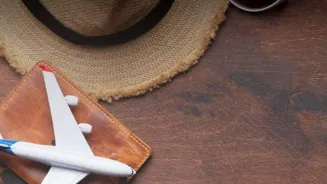Smart Financial Planning for Your Dream Holiday - Tips to Create a Travel Budget. Read more for a fantastic vacation!
Travelling, especially after being stuck at home, is something everyone dreams of. But
often, the biggest hurdle between you and that perfect vacation is money. Many people postpone their travel plans because they are worried about the expenses. But don't worry!

With a bit of clever planning and budgeting, your dream trip can become a reality without burning a hole in your pocket. This article will guide you step-by-step on how to create a travel budget that works for you, ensuring you have a fantastic and financially sound holiday.
Track expenses for a month to plan travel budget effectively
The first step to managing your travel expenses efficiently is to have a clear understanding of where your money is currently going. Start by tracking your current spending habits for a month. Note down every expense, no matter how small, from your morning chai to your weekend movie ticket.
You can use a notebook, a spreadsheet, or even a budgeting app on your phone. Once you have a record of your spending, categorize your expenses. This could include categories like housing, food, transportation, entertainment, and miscellaneous.
Identifying where your money is going will help you discover areas where you can potentially cut back and save more for your trip. This will give you a realistic benchmark to plan your travel budget effectively. This proactive approach will set the foundation for a successful travel fund.
Set a realistic travel savings goal by researching costs, breaking it down, and automating savings
Next is setting a realistic savings goal for your travel fund. Start by researching the average cost of your desired trip. Consider factors like accommodation, transportation, food, activities, and souvenirs.
Once you have an estimated total cost, break it down into smaller, more manageable monthly or weekly savings targets. Look at your monthly income and figure out how much you can realistically set aside each month without compromising your essential needs.
Automate your savings by setting up a recurring transfer from your checking account to a dedicated savings account specifically for your travel fund. This ensures consistent contributions and makes it easier to track your progress towards your goal.
Seeing your savings grow over time will keep you motivated and on track.
Explore affordable transportation options for travel savings
Transportation costs can take a big chunk out of your travel budget. So, explore various options to find the most affordable way to reach your destination. For domestic travel, consider booking train tickets in advance, as they are often cheaper than flight tickets.
Alternatively, look for budget airlines that offer promotional fares. Be flexible with your travel dates and fly during off-peak seasons or weekdays, when prices are generally lower.
Once you arrive at your destination, explore local transportation options like buses, subways, or shared rides to get around. Walking or cycling are also great ways to experience a new place while saving money on transportation.
Also, consider overnight buses or trains to save on accommodation costs.
Explore affordable accommodation like hostels, guesthouses, or Airbnb for budget travel
Accommodation is another significant expense to address. Instead of opting for expensive hotels, explore alternative accommodation options like hostels, guesthouses, or Airbnb. Hostels are a great choice for budget travelers, offering dorm-style rooms and a chance to meet fellow travelers.
Guesthouses often provide a more local experience and can be more affordable than hotels. Airbnb offers a range of options, from apartments to rooms in private homes, allowing you to find accommodation that fits your budget and preferences.
Consider staying slightly outside the city center, as accommodation prices tend to be lower in more remote areas. Look for options that include amenities like a kitchen, allowing you to prepare some of your meals and save on food costs.
Save on food while traveling: eat out smartly, cook, and plan a special meal
To manage your food expenses while traveling, consider a combination of eating out and cooking your own meals. Eating street food is a great way to sample the local cuisine at a fraction of the cost of restaurants.
Research local markets and grocery stores where you can buy fresh produce and ingredients to prepare your own meals. Pack snacks like fruits, nuts, and granola bars to avoid impulse purchases of expensive snacks while you're on the go.
Look for restaurants that offer lunch deals or happy hour specials, which can be more affordable than dinner options. Also, remember to carry a reusable water bottle, and refill it whenever possible to avoid buying bottled water. Plan to have a special meal on the last day of the trip as reward.
Create contingency fund for unexpected expenses when traveling
Having some extra cash is important to cover unexpected expenses. Set aside a contingency fund to handle any unforeseen issues. This could include things like medical emergencies, travel delays, or last minute changes to your plans.
Typically, five to ten percent of your total trip budget would go towards unexpected costs. Research travel insurance options and consider purchasing a policy that covers medical expenses, trip cancellations, and lost luggage.
Before you leave, inform your bank or credit card company of your travel dates and destinations to avoid any issues with your cards being blocked.
Create a travel budget for an affordable dream vacation
By following these tips, you can create a travel budget that works for you, making your dream vacation a reality without breaking the bank. Remember, planning and discipline are key to ensuring a financially sound and enjoyable trip. Happy travels!
AI Generated Content. Glance/InMobi shall have no liability for the content














